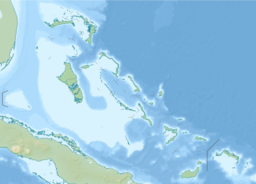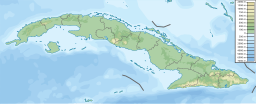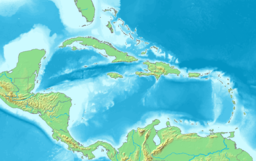Old Bahama Channel
| Old Bahama Channel | |
|---|---|
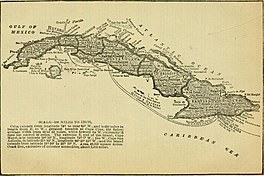 1899 map with Old Bahama Channel−Canal Viejo de Bahama. | |
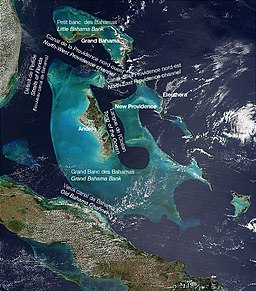 Straits and canals around the Bahamas Islands. | |
| Coordinates | 22°46′02″N 78°24′01″W / 22.76722°N 78.40028°W |
| Basin countries | Cuba Bahamas |
The Old Bahama Channel (Spanish: Canal Viejo de Bahama) is a strait of the Caribbean region, between Cuba and the Bahamas.
Geography
[edit]The strait/channel is located off the Atlantic coast of north-central and northeastern mainland and the Sabana-Camagüey Archipelago of Cuba, and south of the Great Bahama Bank of the Bahamas. It is approximately 100 miles (161 km) long and 14 miles (22.5 km) wide at its narrowest place. It divides the northernmost bank of the Caribbean islands into two nearly equal parts. To the north and northeast is the Great Bahama Bank and the Bahama Islands; and to the south the bank on which the island of Cuba rests.
The Old Bahama Channel is connected at its north-western extremity end to the Florida Straits by two arms, enclosing Cay Sal Bank, of which the northern is called Santaren Channel and the southern Nicholas Channel. It is considered as terminating on the east between Cape Maysi in Cuba, and Inagua island in the Bahamas. However, it can also be considered to include the deep sea which separates the minor banks north of Haiti from this island, so that it extends to the Mona Passage, or the strait between the islands of Hispaniola and Puerto Rico.
The narrowest portion of the Old Bahama Channel is between 22° and 23° North latitude, where its width rarely exceeds 12 miles (19 km).[1][obsolete source]
History
[edit]In the 1500s, Alonso Valiente was one of the discoverers of the Old Bahama Channel.[2]
The Spanish colonial trade routes in the Spanish West Indies originally favored the Old Bahama Channel, then shifted to the Straits of Florida—New Bahama Channel, as it was a safer alternative.
In the Old Bahama Channel, ship captains had to pick their way through the low-lying cays and shoals of the southern Bahama Banks.[3] A Royal Navy vessel, the 44-gun HMS Chesterfield, was wrecked in the Channel in 1762.[4]
References
[edit]- ^ Society for the Diffusion of Useful Knowledge (Great Britain) (1833), Penny Cyclopaedia of the Society for the Diffusion of Useful Knowledge, C. Knight
- ^ "Asociación Alcaldes. V Centenario" [Informaciones de interés cultural, Medina de las Torres]. Medina de las Torres (in Spanish). Asociación Alcaldes. Archived from the original on 24 July 2011. Retrieved 7 February 2018.
- ^ Great Britain, Hydrographic Dept (1887). Captain Edward Barnett (ed.). The West India Pilot. Vol. II. The Caribbean Sea, from Barbados to Cuba; with the Bahama and Bermuda Islands, and Florida Strait (4th ed.). Great Britain, Hydrographic Dept. pp. 487–8. ISBN 127944343X.
- ^ Winfield, Rif (2007). British Warships of the Age of Sail 1714–1792: Design, Construction, Careers and Fates. Seaforth. p. 171. ISBN 9781844157006.
- Straits of the Caribbean
- International straits
- Bodies of water of Cuba
- Bodies of water of the Bahamas
- Bahamas–Cuba border
- Geography of Camagüey Province
- Geography of Ciego de Ávila Province
- Geography of Cienfuegos Province
- Geography of Guantánamo Province
- Geography of Holguín Province
- Geography of Sancti Spíritus Province
- Geography of Villa Clara Province

